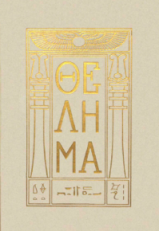
Do what thou wilt shall be the whole of the Law.
What is the “ideal Thelemite”? In short: There is no such thing as an “ideal Thelemite.” The Law of Thelema is “Do what thou wilt,” which means that every individual is sovereign. Every man and every woman has their own individual Law, their own unique Will. As William Blake said, “One Law for the Lion and the Ox is Oppression.”
The fact that “There is no law beyond Do what thou wilt” (Liber AL, III:60) is precisely why there are no standard or universal ideals. Each individual has their own Will, and each Law must have its own, unique “ideal.” Regarding the fact that there are no standards or universal ideals, Crowley writes:
“What is necessary is not to seek after some fantastic ideal, utterly unsuited to our real needs, but to discover the true nature of those needs, to fulfill them, and rejoice therein.” —Magick Without Tears, chapter 8
“Know then, o my Son, that all Laws, all Systems, all Customs, all Ideals and Standards which tend to produce Uniformity, being in direct Opposition to Nature’s Will to change and to develop through Variety, are accursèd.” —Liber Aleph, chapter 31: ‘De Lege Motus’
“Each child must develop its own Individuality, and Will, disregarding alien Ideals. … Let children educate themselves to be themselves. Those who train them to standards cripple and deform them. Alien ideals impose parasitic perversions. … Standards of education, ideals of Right-and-Wrong, conventions, creeds, codes, stagnate Mankind.” —On the Education of Children
One might argue that Thelema is itself a “universal ideal.” Thelema is a universal Law insofar as “Do what thou wilt” states that each individual must find their own unique Will, their own particular Law. The universal ideal is therefore that there are no universal ideals: each must “discover the true nature of [one’s real] needs, to fulfill them, and rejoice therein.” The only absolute is that there are no absolutes; the only constant is change.
In a way, then, we can say that the “ideal Thelemite” is one who does their own Will and lets others do their Wills. This “ideal Thelemite” follows their own Law and others follow their own, different Laws; there are no universal ideals of “what is best” or “what is absolutely Right and Wrong” beyond this. This is what is sometimes called the “Yama and Niyama of Thelema.”
We borrow the terms “Yama” and “Niyama” from the Hindu system of raja yoga as explained, among other places, in Patanjali’s classic treatise called the Yogasutras. Yama and Niyama are words that mean opposite things, similar to “Thou shalt not” (Yama) and “Thou shalt” (Niyama). Unfortunately, translating them into English is not easy, but their real meaning in the context of Thelema becomes clear with just a little explication.
The Yama of Thelema is to have the self-discipline to find one’s own Will and to do that Will. As it is said, “Thou hast no right but to do thy will” (Liber AL, I:42). The Niyama of Thelema is to mind your own business or, in other words, to allow others to find and do their Wills. The Niyama is to extend the same absolute liberty to do your own Will that you rightfully claim to all other individuals. In short:
- The Yama of Thelema: Do what thou wilt shall be the whole of the Law. Thou hast no right but to do thy will.
- The Niyama of Thelema: Mind your own business.
Yama: Crowley mentions that Yama means something similar to “control” or “the word ‘inhibition’ as used by biologists.” Basically, Yama means the self-discipline to remain on the “track” or “path” of one’s True Will and not swerving from it. “Thou hast no right but to do thy will,” (Liber AL, I:42) which shows that you are by definition outside of your sole right when you deviate from your Path. This requires the self-discipline to remain true to one’s own Law. As Crowley writes, “What is true for every School is equally true for every individual. Success in life, on the basis of the Law of Thelema, implies severe self-discipline.” Crowley gives a succinct summary of the Yama of Thelema when he writes:
“I wish to thunder forth once more that no questions of right or wrong enter into our problems. But in the stratosphere it is ‘right’ for a man to be shut up in a pressure-resisting suit electrically heated, with an oxygen supply, whereas it would be ‘wrong’ for him to wear it if he were running the three miles in the summer sports in the Tanezrouft. This is the pit into which all the great religious teachers have hitherto fallen, and I am sure you are all looking hungrily at me in the hope of seeing me do likewise. But no! There is one principle which carries us through all conflicts concerning conduct, because it is perfectly rigid and perfectly elastic: — ‘Do what thou wilt shall be the whole of the Law.’ That is Yama.” —Eight Lectures on Yoga, “Yama”
Niyama: There is no “opposite term” of Yama, or self-discipline, to adequately translate “Niyama.” We might say that the complementary term of “self-discipline” is, in this case, something like “other-discipline.” If Yama is the discipline we have toward ourselves in remaining true to our own Law, Niyama is the discipline we have toward others in allowing them to remain true to their own Laws. This “other-discipline” can be summarized as “Mind your own business.” Crowley says as much in several places:
“Mind your own business! is the sole sufficient rule.” —Magick Without Tears, chapter 15
“I will have thee to know, moreover, my dear Son, the right Art of Conduct with them whom I shall give thee for Initiation. And the Rule thereof is one Rule: Do that thou wilt shall be the whole of the Law. See thou constantly to it that this be not broken; especially in the Section thereof (if I dare say so) which readeth Mind thine own Business. This is of Application equally to all, and the most dangerous Man (or Woman, as has occurred, or I err) is the Busy-body. Oh how ashamed are we, and moved to Indignation, seeing the Sins and Follies of our Neighbours!” —Liber Aleph, chapter 96: ‘De Discipulis Regendis’
“Every Star has its own Nature, which is ‘Right’ for it. We are not to be missionaries, with ideal standards of dress and morals, and such hard-ideas. We are to do what we will, and leave others to do what they will. We are infinitely tolerant, save of intolerance”. —New Comment to Liber AL, II:57
“It is necessary that we stop, once for all, this ignorant meddling with other people’s business. Each individual must be left free to follow his own path.” —New Comment to Liber AL, I:31
The name Crowley gives for someone who fails to uphold the Niyama of Thelema is a “busy-body.” A busy-body is someone who is concerned about what other people are doing, how other people are doing things, and why other people are doing things. A busy-body is concerned about someone else’s True Will rather than being concerned with their own. They are indignant about the “sins and follies” of their neighbors rather than focusing on themselves, and generally meddle in others’ affairs. A busy-body, in short, does not mind their own business.
We are all busy-bodies to some degree or another whenever we impose our standards, expectations, or ideals on others, whenever we think that “we know best” for anyone other than ourselves. This can be anything from the most mundane and concrete such as criticizing another’s choice in clothing to the more subtle such as expecting others to perform the same spiritual practices as oneself or insisting that people who believe something different from oneself must be “corrected.”
When put into practice, we quickly see that the Niyama of Thelema – that of minding one’s own business and allowing others to do their Wills – is not simply a limp passivity. It is not “grinning and bearing it,” which implies that – deep down – you actually don’t want them to do their Wills (let alone that you obviously aren’t rejoicing in it!). The Niyama of Thelema is an active, positive thing: we actively affirm the right of each individual to know and do their True Will. When we greet one another, we look fearlessly into each others’ eyes and say, “Do what thou wilt shall be the whole of the Law.” This is to say to everyone you meet, as Crowley writes, “Look, brother, we are free! Rejoice with me, sister, there is no law beyond Do what thou wilt!”
Some might say that it takes strength to control everything, but it is a much greater strength to not need to control everything and everyone. It is a symptom of being unsure and anxious to feel the need to control people by insisting that it’s your way or the highway. That is: Being a busy-body is a symptom of weakness and fear, although it will inevitably mask itself in the “virtue” that essentially comes down to “knowing what is best” for someone else (let alone “all other Thelemites”!). That is where “compassion” and “altruism” and even “teaching” teeters into the realm of folly.
We will all inevitably hear (or probably have already heard) some self-avowed Thelemite question why others are not doing this or that, insisting they are complaining about others because they “really care” about Thelema. Many of us have fallen prey to this ourselves (“Oh no! Definitely not me!” … Yes, you especially!). This “care” – this “noble cause” of ours – is nothing but the demands of a busy-body cloaking itself in guise of “virtue.” We all should remember to “veil not your vices in virtuous words” (Liber AL, II:52). This “care” basically comes down to insisting that everyone else must have the same values as yourself, which is exactly opposite to affirming “Do what thou wilt.” If you ever find yourself asking, or hear someone else asking, something that amounts to “Why doesn’t this other person/these other people think that this is important?” The answer is most likely “Because it isn’t important to them, nor does it need to be”… or, more pointedly, “Mind your own business.” This is why there is no “ideal Thelemite.” This is why “One Law for the Lion and the Ox is Oppression.” Any insistence otherwise will quickly fall into the same trap that characterized the Old Aeon, the tyranny of a single standard or ideal for all people, rather than a multiplicity of Laws, each uniquely suited to the individual.
Again: The Niyama of Thelema is not a limp, passive, “grin and bear it” quality. On the contrary: It takes an active, almost virile quality to say to every individual, “I don’t know what your Will is, I don’t know what your ‘good’ or ‘bad’ are, I don’t even know how your Will may interact with and effect mine, but I grant you the absolute right to do your Will and I claim the equally absolute right to do my Will.” This is far from a passive “letting things happen”; the Niyama of Thelema is an active affirmation, an enthusiastic encouragement, a joyous battle-cry for each and every man and woman to discover their real needs, to fulfill them, and to rejoice therein. To believe otherwise is the essence of tyranny; to act otherwise is the essence of oppression. This requires the strength to stand in the midst of uncertainty and ambiguity, of accepting variety and difference of style and opinion, of not knowing “how everything should be” for everyone or anyone else. Any concern arising about others “not doing it the right way” should be a reminder to us all to re-focus on our own Will: this should be a reminder of the Yama of staying true to our own Path and the Niyama of affirming the right of others to be true to their Paths.
This is the simplicity and the beauty of the Law of Thelema: There are no absolute standards or universal ideals.  Every man and every woman has the indefeasible right and duty to know and do his or her True Will. Each has their own standard, their own Law. Any occurrence of someone imposing their Law on another, or anyone accepting a Law imposed on them by another, is a distortion and deforming of a star’s true nature. It is our Yama to adhere to this Law of our own True Will, and it is our Niyama to affirm the right of every other individual to adhere to the Law of his or her own True Will. This is real Freedom, the perfect order on Earth as the stars move seamlessly in the perfect order in the Heavens; this why our Law of “Do what thou wilt” is the Law of Liberty itself.
Every man and every woman has the indefeasible right and duty to know and do his or her True Will. Each has their own standard, their own Law. Any occurrence of someone imposing their Law on another, or anyone accepting a Law imposed on them by another, is a distortion and deforming of a star’s true nature. It is our Yama to adhere to this Law of our own True Will, and it is our Niyama to affirm the right of every other individual to adhere to the Law of his or her own True Will. This is real Freedom, the perfect order on Earth as the stars move seamlessly in the perfect order in the Heavens; this why our Law of “Do what thou wilt” is the Law of Liberty itself.
Love is the law, love under will.

If you enjoy these writings, please consider pledging $1+ on my Patreon
